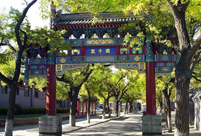 Global ambassadors of ecotourism gather in Nanjing
Global ambassadors of ecotourism gather in Nanjing
 Taiwan woman marries into Kazak family, 100 sheep plus a flat as dowry
Taiwan woman marries into Kazak family, 100 sheep plus a flat as dowry
 College girls take graduation photos under water in Chongqing
College girls take graduation photos under water in Chongqing
 Cartoon: Xi and football
Cartoon: Xi and football
 Chinese influence sweeps ROK
Chinese influence sweeps ROK
 Post-90s beauty boxer grapples four men
Post-90s beauty boxer grapples four men
 3,000-year-old tea town through lenses
3,000-year-old tea town through lenses
 22 archaeological sites along Silk Road in China
22 archaeological sites along Silk Road in China
 Football babies, Samba dancers embrace 'World Cup'
Football babies, Samba dancers embrace 'World Cup'
 Beautiful scenery along China’s Grand Canal
Beautiful scenery along China’s Grand Canal
NANCHANG, July 9 -- Graduates with higher degrees in China are feeling the pinch in the job market as competitors with lower education levels rise on par and catch up as magnets for employers.
The situation came to the fore following publication of the latest statistics this week showing that by the end of June 2014, vocational school graduates reported the highest employment rate in east China's Jiangxi Province, standing at 82.7 percent.
Bachelor's, master's and Ph.D. graduates in the province had employment rates of 80.25 percent, 69.48 percent and 73.5 percent respectively.
Many Chinese students invariably think that a higher degree guarantees better job chances, but those with lower education levels have been bucking the trend in recent years by showing better employment rates in the job market.
Vocational school students in the northeastern province of Jilin reported an employment rate of 84.38 percent in 2013, higher than their counterparts with bachelor's and master's degrees at 83.34 percent and 75.07 percent respectively. Similar trends were reported in the eastern provinces of Zhejiang and Jiangsu.
Yu Le, a postgraduate who majored in translation at Jiangxi Normal University, has sent her resume countless times online and went to multiple job interviews in the first half of the year.
But the 24-year-old student is now sitting on pins and needles as she has not nailed down a satisfying job pending the university's graduation ceremony this week.
Her friend Li Yi, a vocational school graduate, however, easily snared a contract with a Japanese company for a salesman position.
"My master's degree did not give me much advantage against other job seekers," Yu said. "I wonder if I made the right decision by spending two more years on campus," she told Xinhua.
WANING AUTHORITY OF HIGHER DEGREES
One of the underlying reasons for the situation is that the prestige of higher degrees is waning amid lowering education quality.
China started to expand enrollment of college students in 1999 in a step toward stimulating a weak economy and easing employment pressure. In a similar scheme, the country encouraged the expansion of postgraduate enrollment in 2009.
The expansions have prompted a spike in graduate numbers. Under the ambitious schemes, the number of graduates is estimated to surge to 7.27 million in 2014, five times of that eleven years ago and the highest in history.
"Colleges and students may have boomed over the years, but education quality has been compromised, and so has the authority of higher degrees," said Xiong Bingqi, vice director of 21st Century Research Institute, an independent think tank in Beijing.
Xiong said lots of students pursue higher education not because they are passionate about academic research, but to stave off the grim job market, only to find themselves competing with their "lower" peers.
Students with higher degrees also tend to be pickier than others. According to a survey by MyCOS Data, a Beijing-based firm in higher education consulting and outcome evaluation in China, vocational school graduates prefer jobs in small and medium-sized private companies while undergraduates and postgraduates put state-owned enterprises and government jobs on their priority list.
"Two years ago, I would be happy to be a teacher at an English training school, but now with a master's degree, I expect to find a job with better social status and higher income," said Yu Le. She admitted she has missed quite a few opportunities due to hesitation.
But opportunities for people like Yu are decreasing thanks to the sluggish recovery of the global economy and the slowdown of Chinese economic development, said Liao Mingbo, an official from the employment service department of Jiangxi Province.
"A lot of companies have cut their recruitment quotas by a large margin and there are more entry-level positions than high-end vacancies," he said.
Li Yi, on the other hand, is under no illusions amid intense competition.
"I only have a vocational school degree, so I don't expect too much. When a good opportunity comes, I just grasp it," Li said.
Meanwhile, employers have become more rational and less picky about education degrees.
"Except for certain research posts, we don't require employees to have a master's or a Ph.D. degree; what really matters are their practical skills," said a staff member from the human resources department of Baidu.com, China's top search engine.
In an industrial park in Jiangxi's Jinxian County, scores of young graduates with technical school diplomas boast a monthly salary of 6,000 yuan (960.6 U.S. dollars), and such skilled workers are still thin on the ground there.
Employers interviewed by Xinhua reporters said that they like to hire undergraduate job candidates who "have higher work efficiency" than those with master's or Ph.D degrees, as the latter focus more on research than practical work. Undergraduates are also less prone to job-hopping.
CHANGE OF MENTALITY NEEDED
As the cream of the crop face pressure in the job market, experts have suggested a change in their mentality to tackle the quandary.
Liao Mingbo said that soon-to-graduate college students should adjust their expectations, stop being too picky and focus on how to excel in their posts.
Zhao Min, head of the enrollment and employment office at East China Jiaotong University in Jiangxi Province, said that China should slow down the mindless expansion of higher education and that universities need to take market needs into consideration to adjust their enrollment plans and curricula.
"Universities should beef up efforts to cultivate students' practical skills as well as soft skills such as critical thinking, innovative thinking, communication and decision-making, rather than just the technical know-how," Zhao said.
China has accelerated the reform of postgraduate education in recent years, dividing it into academic and professional types. Academic education aims to foster students' research abilities, while the professional type focuses on improving students' practical and innovative abilities.
Liao added that that the country should create more jobs in the service sector to avoid too much underemployment. He said that universities should popularize and strengthen career development guidance schemes among students to help them discover a suitable career path and instruct them to realize their goals step by step.
 'Seattle's soulmate' - -Pike Place Market
'Seattle's soulmate' - -Pike Place Market Human skeletons of more than 1,600 years old
Human skeletons of more than 1,600 years old BFA goddess poses for graduation photos
BFA goddess poses for graduation photos Separate college entrance exam
Separate college entrance exam Flash mob dance
Flash mob dance Featured hutongs in Beijing
Featured hutongs in Beijing Picturesque scenery of Ghost City
Picturesque scenery of Ghost City Female special assault team in training
Female special assault team in training Children attend First Writing Ceremony
Children attend First Writing Ceremony Chengdu police use social media to boost recruitment
Chengdu police use social media to boost recruitment Secrets unveiled in restoration of the 800-yr-old Buddha
Secrets unveiled in restoration of the 800-yr-old Buddha Heavenly path in Chongli grassland
Heavenly path in Chongli grassland Happy Birthday to "Yuanzai"
Happy Birthday to "Yuanzai" China's manned submersible Jiaolong opens to public
China's manned submersible Jiaolong opens to public Roast Duck Restaurant celebrates 150th anniversary
Roast Duck Restaurant celebrates 150th anniversaryDay|Week|Month